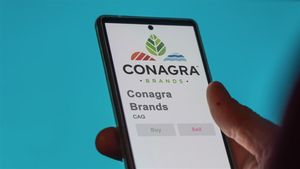The "Global Environmental Testing Market Size, Share, Growth Analysis, By Sample, By Target Tested, By Technology - Industry Forecast 2023-2030" report has been added to ResearchAndMarkets.com's offering.
The global environmental testing market size was valued at USD 7.95 billion in 2021 and is poised to grow from USD 8.62 billion in 2022 to USD 17.67 billion by 2030, growing at a CAGR of 8.4% in the forecast period (2023-2030).
Environmental testing seeks to ascertain the quantity of pollutants in the environment and their effects on all living things. The vast emission of both natural and manmade trash has a detrimental effect on the ecosystem and contributes to global warming. For a sustainable future, all environmental components must be kept in the appropriate balance.
Environmental testing will become more and more popular throughout the projection period as a result of strict environmental laws and regulations, as well as the active involvement of numerous governments and agencies in the monitoring of environmental conditions. Public awareness of environmental degradation has increased as a result of growing industrial activity and pollution in developing nations, which also helps the sector thrive.
Segments covered in this report
The Global Environmental Testing Market is segmented on the basis of sample, target tested, technology, and region. Based on the sample, the Environmental Testing Market is segmented into wastewater/effluents, soil, water, and air.
Based on the target tested, the Environmental Testing Market is segmented into microbial contaminants, organic compounds, heavy metals, residues, and solids. Based on the technology, the Environmental Testing Market is segmented into rapid and conventional. Based on region, the Environmental Testing Market is segmented into North America, Europe, Asia-Pacific, South America, and MEA.
Driver
Strict environmental requirements relating to cleaner fuels and the demand for fuel-air testing are the primary drivers of business growth. Due in large part to the decrease in airborne particles, environmental rules have avoided numerous illnesses and saved countless lives.
Environmental restrictions have had a substantial positive impact on the quality of the air and water, especially in previously contaminated areas. Government rules and legislation require that environmental samples that are analysed by the government and manufacturing businesses be tested, inspected, and certified. Regulations have been put in place to control the inspection, sampling, and testing of environmental samples to check for the presence of pollutants and poisons.
These organisations have put in place a number of initiatives to increase public awareness and set testing requirements in an effort to ensure environmental safety and lessen the health risks associated with pollution. These initiatives are anticipated to have a positive impact on the growth of the environmental testing sector over the course of the forecast period.
Restraint
High capital expenditures are required for the sensitive and exact analytical testing of the sample, which is one factor impeding the industry's growth.
Due to costly sample preparation and high costs, laboratory analysts must use cutting-edge testing technology. Due to the large variety of testing procedures that are currently in use as well as the development of new technology for evaluating environmental sample, environmental testing has undergone a significant change.
High-performance liquid chromatography, spectrometry, and liquid chromatography are examples of advanced technologies used in environmental testing. Technologies are perceptive, exact, and effective.
On the other hand, the suggested technologies have expensive equipment requirements, difficult sample preparation, and calibration issues, all of which restrict market growth. Most analytical techniques can only be used on specific materials, such soil, water, and effluent, although some can also be used to air samples. During the foreseeable period, this is anticipated to restrain market growth.
Market Trends
Growing demand for environmental testing across a range of industries is one of the major trends in the global market for environmental testing. People are more aware of environmental pollution and deterioration now than they were in the past due to rising industrialization in places like Africa and the Asia-Pacific.
As a result, numerous pieces of environmental protection legislation have been passed, opening up a sizable market for environmental testing.
Due to growing pollution and environmental contamination, it is anticipated that a number of adjustments and new environmental safety standards will be put in place over the course of the next five years, mostly in developing countries like the Asia-Pacific region.
The market for environmental testing is probably going to grow as long as new testing techniques for toxins including pesticide residues, heavy metals, and organic compounds are developed.
Companies Mentioned
- Eurofins
- Intertek
- Alex Stewart
- Bureau Veritas SA
- ALS Limited
- SGS SA
- Agilent Technologies, Inc.
- Thermo Fisher Scientific Inc.
- Asurequality Limited
- Merieux Nutrisciences Corporation
- Romer Labs Division Holding GmbH
- R J Hill Laboratories Ltd.
- Symbio Laboratories Pty Ltd.
- Microbac Laboratories, Inc.
- Pace Analytical Services, LLC
- Element Materials Technology Group Limited
- Exova Group Limited
- UL LLC
- LGC Limited
- Suburban Testing Labs
- Environmental Testing, Inc.
For more information about this report visit https://www.researchandmarkets.com/r/g6zqe0
About ResearchAndMarkets.com
ResearchAndMarkets.com is the world's leading source for international market research reports and market data. We provide you with the latest data on international and regional markets, key industries, the top companies, new products and the latest trends.
View source version on businesswire.com: https://www.businesswire.com/news/home/20230619121296/en/
Contacts
ResearchAndMarkets.com
Laura Wood, Senior Press Manager
press@researchandmarkets.com
For E.S.T Office Hours Call 1-917-300-0470
For U.S./ CAN Toll Free Call 1-800-526-8630
For GMT Office Hours Call +353-1-416-8900





